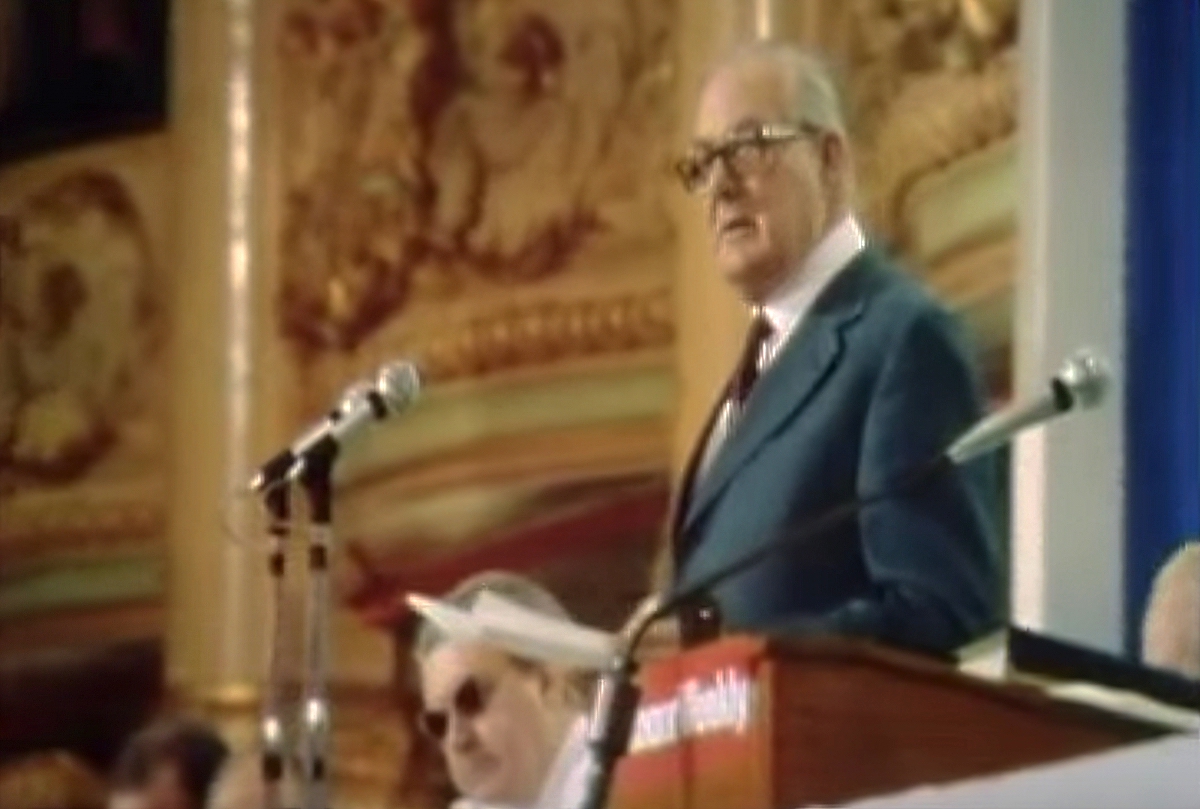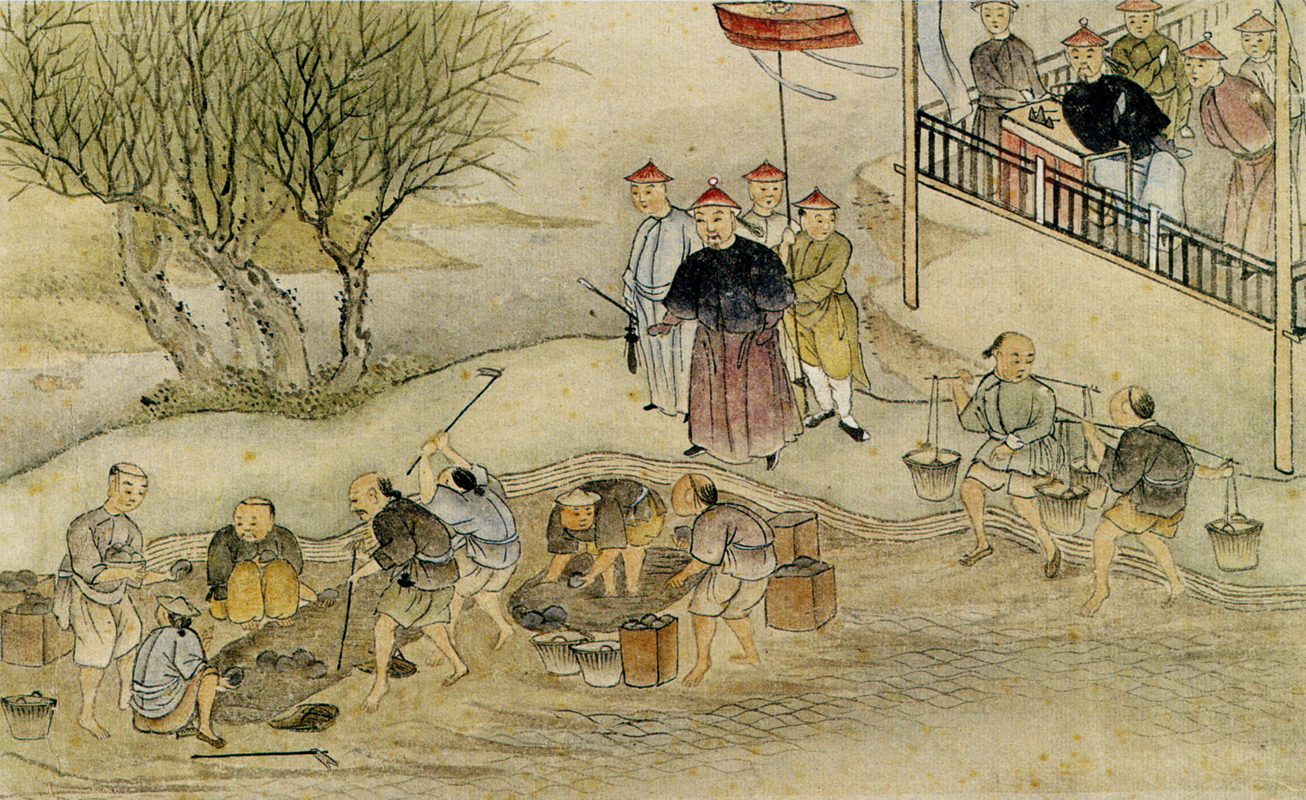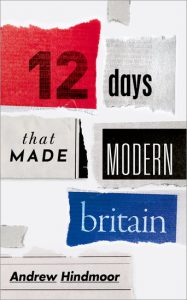Top Stories
Keynes Has Left the Building: Remembering the 1976 Speech That Changed Modern Britain
Callaghan’s speech, a paean to the virtues of austerity economics several decades before the 2008 financial crisis, was a watershed moment in British politics.

The summer of 1976 was famously hot. Temperatures across the UK began to rise in late May and did not break until September. In the south and south-east, average rainfall was the lowest since 1910. In Yorkshire and parts of East Anglia, the reservoirs were emptied and, to preserve available supplies, standpipes were introduced. A Minister for the Drought, Denis Howell, was appointed and invited by the Prime Minister to perform a public rain dance.
With summer drawing to a close and the drought gone, the new political year began, with the party conference season, which, for Labour, was being held in a rain-swept Blackpool. In his September 28 keynote address, James Callaghan, Labour’s leader and Prime Minister, lectured delegates at the conference and a wider audience beyond on the UK’s economic crisis and the need to reduce public spending, borrowing and inflation. Sounding to his critics on the left of the party like a mixture between the new Leader of the Opposition, Margaret Thatcher, and the hated Ramsay MacDonald, the Labour leader who, in 1929, betrayed his party by forming a National Coalition Government with the Liberals and the Conservatives, Callaghan signalled that the world was changing and that the Labour government he led would need to change with it.
Callaghan’s speech, a paean to the virtues of austerity economics several decades before the 2008 financial crisis, was a watershed moment in British politics. This was the point at which Labour, the party of the left, started to publicly say things we might associate with the Conservatives and the right, but which the Conservatives had, until fairly recently, avoided saying out loud for the most part.
At some point during the late 1980s, party political conferences became entirely stage-managed affairs in which evidence of any disagreements was suppressed. (During Labour’s 2005 conference, in Brighton, an 82-year-old anti-war activist, Walter Wolfgang, was ejected from the conference for heckling the Foreign Secretary, Jack Straw, and then, when he tried to re-enter the building, detained by police citing anti-terrorism legislation.) But in the 1970s, conferences (at least the Labour Party ones) tended to be much more rumbustious affairs during which delegates arrived armed with the view that their leaders were politically guilty until proven innocent and in which the leadership, in turn, made clear its lack of confidence in its audience. The year 1976 was, in this respect, a classic of its kind.
* * *
James Callaghan was appointed Prime Minister on the April 5, 1976 following the retirement of Harold Wilson and a leadership election in which, over the course of three ballots, Callaghan defeated five other Cabinet Ministers including the Chancellor of the Exchequer, Denis Healey. Callaghan was 64 years old and a political survivor who had been an MP in Cardiff since 1945 and had served as Chancellor, Home Secretary and Foreign Secretary. He was on the centre-right of the Labour Party with a reputation for being tough on law and order. Both personally and politically, he was also close to many trade union leaders at a time when this was seen as an electoral asset. As someone whose father had been a Chief Petty Officer in the Royal Navy and had left school aged 17 and never been to university, Callaghan, it was thought, was someone who could talk to and forge a connection with Labour’s working-class voters. Above all, Callaghan was regarded as a safe pair of hands who could be trusted to hold the party together through thick and thin.

But Callaghan arrived at 10 Downing Street holding a poor set of cards. On April 7, the MP and former minister John Stonehouse, who was awaiting trial on charges of fraud having faked his own death in November 1974 before fleeing to Australia with his mistress, resigned the Labour whip. As a result, the government was left without a majority and needed to do deals with the smaller parties to pass legislation and escape no-confidence motions. Above all, Callaghan had to confront the fallout from a global economic crisis which had begun in 1973 when the Organization of Arab Petroleum Exporting Countries launched an oil embargo that quadrupled oil prices and stoked inflation.
The key economic and political flashpoint was the value of the pound on foreign exchange markets. Although the Bretton Woods system of globally managed exchange rates had broken down, the government was still intervening to try and prop up the value of the pound relative to other currencies. This was partly an economic problem: A falling pound meant higher import prices and rising inflation. But it was also a political problem: a falling pound was a powerful symbol of the UK’s relative decline.
By the late summer of 1976 Callaghan’s political stock had risen, however. He was felt, by most people, to have negotiated an honourable end to the third “Cod War” with Iceland: a dispute over fishing rights which, whilst comical-sounding in the abstract, had resulted in a serious injury to at least one British fisherman and the deployment of two dozen Royal Navy vessels. Callaghan also had successfully overseen negotiations on how to cut a previously agreed £4-billion sun from the government’s budget and had done so without splitting the Cabinet apart. Furthermore, inflation was falling. To add to the credit side of his ledger, he had brokered a pay deal with the largest unions, the “social contract,” and had negotiated a £10-billion loan from the Group of Ten rich countries and the International Monetary Fund. By September 1976, Callaghan had positioned himself between those further to his left in the Cabinet and those, like Margaret Thatcher, far to his right, and had managed to present himself as the safe custodian of the national economic interest.
* * *
Callaghan easily could have chosen to devote his first conference speech as leader to a few bland policy announcements and routine attacks on the economic incompetence and social callousness of his Conservative opponents. He chose not to do so. Having recently been warned by Bank of England officials of yet another looming balance-of-payments and currency crisis, and conscious of the fact that the loan he had negotiated from the Group of Ten would have to be repaid in December and new credit secured, he decided to instead lecture delegates on what he saw as harsh new economic realities.
Callaghan opened his speech with some words of praise for his predecessor, Harold Wilson, who had, by that time, largely disappeared from public life, and with a heartfelt tribute to his wife. Without much else in the way of a preamble, he then warned that the country continued to face its “most dangerous crisis since the war.”
He cautioned that, “for too long, perhaps ever since the war, we postponed facing up to fundamental choices and fundamental changes in our society and in our economy.” The UK, he went on, “has been ready to settle for borrowing money abroad to maintain our standards of life, instead of grappling with the fundamental problems of British industry,” which, as he saw it, were low productivity and spiralling wage costs.
The next part of the speech survives on YouTube. Wearing a sombre suit, a light pink shirt and a hideous tie, Callaghan exhibits a world-weary, facts-of-life, been-there-and-done-it realism. He warns against a “short-lived consumer boom of the kind which used to buy success at the polls…but which never bought success in the world’s markets or at the work place.” This was, not too subtly, a dig at the former Conservative Chancellor, Anthony Barber, who, in anticipation of the next general election, had, in 1972, cut income taxes and announced tax concessions to industry at the cost of higher inflation and a growing budget deficit. The “Barber boom,” as it had soon become known, was still working its way through the economic system half a decade later and had become a catch-all rhetorical prop of Labour’s attacks on the Conservative’s economic credibility.
Callaghan was setting his sights higher, however. Shortly after becoming Prime Minister, he had warned that higher inflation was the key cause of growing unemployment, and that inflation was a problem which had been ignored by successive governments, Labour and Conservative, for far too long. Returning to that theme, he now argued that: “the cozy world we were told would go on for ever, where full employment would be guaranteed by a stroke of the Chancellor’s pen, cutting taxes, deficit spending, that cozy world is gone.” Rising unemployment was, he accepted, a huge economic and social problem. But it was a problem which was caused not by government spending too little but, “quite simply and unequivocally,” by “paying ourselves more than the value of what we produce” and so pricing people out of jobs.
In the next part of the speech, the bit which, Callaghan said, “made the fur fly,” he spoke more generally about the role of government:
We used to think that you could spend your way out of a recession, and increase employment by cutting taxes and boosting Government spending. I tell you in all candour that that option no longer exists, and that in so far as it ever did exist, it only worked on each occasion since the war by injecting a bigger dose of inflation into the economy, followed by a higher level of unemployment as the next step. Higher inflation followed by higher unemployment. We have just escaped from the highest rate of inflation this country has known; we have not yet escaped from the consequences: high unemployment…that is the history of the last 20 years.
Callaghan concluded the speech with a promise that “we shall meet the crisis—and tomorrow the day will be ours.” But this was not a speech intended to rouse the faithful. It was a speech meant to warn of tough times and tough choices ahead. He sat down to applause but no standing ovation.
The name which is not mentioned in Callaghan’s speech but without which it is impossible to understand the significance of what he said is that of the economist John Maynard Keynes. In 1936, Keynes, already the country’s most famous economist, published his General Theory of Employment, Interest and Money, and did so at a moment when the UK economy was only just beginning to emerge from a seven-year-long depression. The General Theory was a sustained assault upon what Keynes regarded as the idiocies of the “classical” school of economists and of the governments which had mistakenly followed their advice. Classical economists—a term coined by Karl Marx to describe the liberal economics of David Ricardo and James Mill, but which Keynes traced back much further to Adam Smith—believed the best thing governments could do to bring a speedy end to recessions and to promote growth was to do nothing. If governments, under pressure from the public, decided to try and spend their way out of a recession, they would simply end up saving businesses that ought not to be saved; running up budget deficits; and fuelling inflation.
Keynes’s key insight was that, in certain situations, a free market economy could find itself locked into a downward spiral from which there was no natural escape. The answer, Keynes argued, was government intervention. To stimulate demand and create the right conditions for investment and job creation, the government ought to raise spending or cut taxes. In the short run, any additional public spending would, as the Treasury argued, mean a budget deficit and government borrowing. This was, nevertheless, Keynes argued, a price worth paying. When growth resumed, tax revenues would go up and the deficit could be paid back.
For the Labour Party, Keynesianism was a godsend. Before the General Theory was published, the Labour Party had had to argue either that capitalist economies were inherently unstable and that mass nationalization and centralized economic planning were the only option, or that there was no real alternative to economic austerity. The problem with the first strategy was that it allowed Labour’s opponents to argue that it was only half a step away from Communism. The problem with the second strategy was that it did not give voters any reason to think that voting Labour would make any difference. Keynesianism offered Labour a third way.
Academics continue to argue about the precise impact of Keynesianism on the day-to-day management of the British economy in the post-war years. But whether deservedly or not, Keynesianism was awarded much of the credit in the UK and beyond for a quarter of a century of high growth, high employment and rising wages.
But the Keynesian intellectual consensus began to break down in the early 1970s. One important critic returning to the fray at this time was the Austrian-born economist Friedrich Hayek, who had argued with Keynes in the early 1930s. In 1944, Hayek had however published The Road to Serfdom. This was not a dry work of economic theory but a political polemic. Hayek argued the Western democracies were in danger of abandoning market individualism in favour of state collectivism and political tyranny.
Hayek was awarded the Nobel Prize for economics in 1974. Enjoying his new-found economic respectability, he now denounced the “fatal idea that unemployment is predominantly due to an insufficiency of aggregate demand.” In Hayek’s eyes, the problem Britain faced was inflation, over-powerful trade unions, and endlessly interfering governments. Hayek was joined in his attacks on Keynesianism by the Chicago-based “monetarist” economist Milton Friedman. Friedman was, like Hayek, a classical economic liberal who believed free markets, left to their own devices, invariably worked.
The additional twist to Friedman’s analysis was his claim that inflation was caused primarily by changes in, and an over-expansion of, the money supply, and that attempts to use government spending and deficits to reduce unemployment in the short term simply had the predicable effect of increasing inflation and the underlying or “natural” rate of unemployment in the long term: an argument which, as we have seen, featured front and centre in Callaghan’s speech.
The significance of Callaghan’s 1976 speech should now be clearer. Yes, the speech was a rebuke to delegates who, Callaghan thought, understood almost nothing about the challenges the government was facing. Yes, the speech was also about assuring potential investors that the government could be trusted to do the right thing. But the speech was much more than this. It was a forthright repudiation of an economic philosophy which had, since the 1940s, been treated as something approaching gospel by successive Labour and Conservative governments.
While Callaghan’s Blackpool speech did not receive a standing ovation, it did receive other endorsements. The Times and The Financial Times were impressed. The outgoing U.S. President, Gerald Ford, told Callaghan he had delivered ”one helluva speech.” Milton Friedman told the host of the BBC’s Money Programme, one Peter Jay, that Callaghan had said the right things in the right way. Jay, for his part, pronounced in a newspaper column that Callaghan’s speech constituted “what must surely be the most breathtakingly frank public announcement since Saint Paul’s first epistle to the Corinthians.”

This is an adapted excerpt from Twelve Days that Made Modern Britain by Andrew Hindmoor. Copyright 2019 by Andrew Hindmoor, and published by Oxford University Press. All rights reserved.






